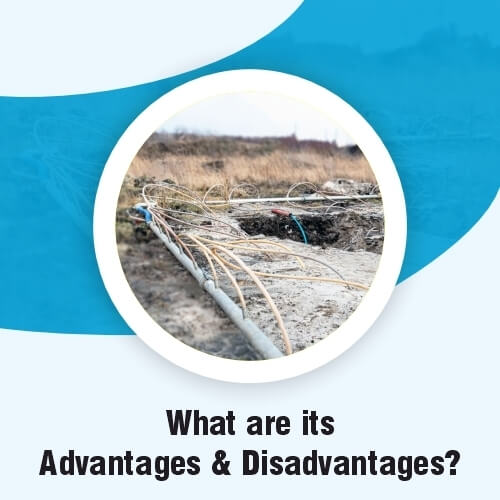Introduction to Well-point Systems
What are Well-point Dewatering Systems? Let’s try to understand.
A wellpoint is a small-diameter, shallow well that is used to remove groundwater from an area. It consists of a perforated pipe that is driven into the ground, with a riser pipe that connects it to a pump. The pump creates a vacuum that draws the water up to the riser pipe and out of the wellpoint.
Well-point Dewatering Systems are used in a variety of applications, including:-
- Construction: to prevent flooding of excavations, dewatering pumps for construction are used.
- Mining: to control water inflow into mines
- Foundations: to lower the water table around foundations to prevent settlement
- Tunneling: to remove groundwater from the tunnel face
- Landfills: to control leachate
- Irrigation: to extract groundwater for irrigation
- Hydro projects
- Water supply projects
- Bridge construction
- Basement construction
- Underground tank construction
- Dewatering for agriculture purposes
Well-points can be used in various soils, but they are most effective in granular soils such as sand and gravel. They are not as effective in clay soils, as the clay can clog the perforations in the pipe.
The spacing of well-points depends on the depth of the water table, the permeability of the soil, and the amount of water that needs to be removed. Typically, well points are spaced about 5 to 10 feet apart.
The pump that is used with a wellpoint can be a vacuum pump or a submersible pump. Vacuum pumps are typically used for shallow well points, while submersible pumps are used for deeper well points.
Well-points are a versatile and effective way to control groundwater. They are relatively inexpensive to install and operate, and they can be used in a variety of applications.
Thus, if you are looking for dewatering pumps for rent, choose Well-point Dewatering Systems if your site is suitable for it.
Additional Points About Well-point
- The Well-point pipe is typically made of PVC or steel.
- The perforations in the pipe are typically about 1/8 inch in diameter.
- The riser pipe is typically made of PVC or steel, and it is sized to match the pump.
- The pump is typically located in a sump or tank and is connected to the riser pipe by a flexible hose.
- The well points are typically connected to each other by a header pipe.
- The header pipe is connected to the pump by a flexible hose.
The wellpoint system is designed so that the water that is removed from the well points is discharged to a safe location. This could be a storm drain, a sewer, or a holding tank.
Wellpoints can be a very effective way to control groundwater. However, they are not without their drawbacks. Loud noise is one of the drawbacks of well-point dewatering systems. Another drawback is that they can create a vacuum that can suck up dirt and debris.
Advantages and Disadvantages of a Well-point System
Let’s have a look at the advantages and disadvantages of a Well-point Dewatering System:-

Advantages:-
- Relatively inexpensive to install and operate: Well-point dewatering systems are relatively inexpensive to install and operate. The cost of the system will vary depending on the size of the system, the depth of the water table, and the permeability of the soil. However, well-point systems are typically less expensive than other methods of dewatering, such as deep well pumping.
- Versatile and can be used in a variety of applications: Well-point systems can be used in a variety of applications, including construction, mining, foundations, tunneling, landfills, and irrigation. They are a versatile option that can be used to dewater a wide range of sites.
- Quick to install in most ground conditions: Well-point systems can be installed quickly in most ground conditions. The installation process is relatively simple and can be completed in a matter of days. This makes them a good option for projects where time is a factor.
- Easy to maintain: Well-point dewatering systems are relatively easy to maintain. The only regular maintenance required is to check the pump and well points for leaks. This can be done by a qualified technician or by the project owner.
- Can be used for both large and small-scale projects: Well-point systems can be used for both large and small-scale projects. The size of the system will vary depending on the needs of the project. However, well-point systems are a scalable option that can be adapted to meet the needs of any project.
- Steel self-jetting well points can also be deployed, which are both reusable and advantageous in environments with limited headroom. Steel self-jetting well points are a type of well point that can be reused. This makes them a cost-effective option for projects where the well points will need to be removed and reinstalled multiple times. They are also advantageous in environments with limited headroom, as they can be installed without the need for a large excavation.
Disadvantages:-
- Can be noisy: Well-point systems can be noisy, especially the pumps. This can be a problem in residential areas or other areas where noise is a concern.
- Can create a vacuum that can suck up dirt and debris: The vacuum created by the pump can suck up dirt and debris into the well points. This can clog the well points and reduce their effectiveness.
- Not as effective in clay soils: Well-point systems are not as effective in clay soils as they are in granular soils. This is because clay soils are less permeable and can clog the well points more easily.
- May not be able to remove large amounts of water: Well-point systems may not be able to remove large amounts of water. This is because the pumps are limited in the amount of water they can pump.
- Requires continuous pumping: Well-point systems require continuous pumping to remove water from the ground. This can be a problematic situation in areas where power outages occur often.
Conclusion
Overall, well-point systems are a versatile and effective way to control groundwater. They are relatively inexpensive to install and operate, and they can be used in a variety of applications.
If you are considering using a well-point system, it is important to weigh the advantages and disadvantages carefully to determine if it is the best option for your project.
If you are looking for the best dewatering pump price, contact Perennial Technologies. At Perennial Technologies, we provide Well-point dewatering pumps for rent. We are also an expert provider in load banks rental, gensets on rent, etc. as per customer requirements.


